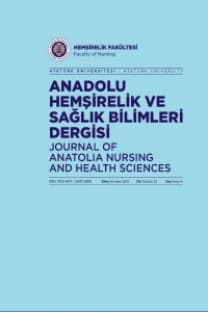Simülasyon Uygulamalarının Hemşirelik Öğrencilerinin Acil Vaka Yönetim Becerilerinin Geliştirilmesine
THE EFFECT OF SIMULATION PRACTICES ON THE DEVELOPMENT OF NURSING STUDENTS' EMERGENCY CASE MANAGEMENT SKILLS
___
- 1. Kavlu I, Pınar R. Effects of job satisfaction and burnout on quality of life in nurses who work in emergency services. Türkiye Klinikleri Tıp Bilimleri Dergisi. 2009;29(6):1553-5.
- 2. Yava A, Çiçek H, Tosun N, Yanmış N, Koyuncu A, Güler A, et al. Factors influencing use of research results by cardiology and cardiovascular surgery nurses. Anatolian Journal of Clinical Investigation 2008;2(4):160-6
- 3. Çınar O, Çevik E, Salman N, Cömert B. Emergency Severity Index triage system and implementation experience in a university hospital. Turkish Journal of Emergency Medicine 2010;10(3):126-31.
- 4. Akdemir N, Özdemir L, Akyar İ. The educational status of internal medicine nursing within post-graduate education in Turkey. Anadolu Hemşirelik ve Sağlık Bilimleri Dergisi. 2011;14(1):50-8.
- 5. Bias CGS, Agostinho LS, Coutinho RP, Barbosa GS. Simulation in emergency nursing education: An integrative review. International Journal of Nursing Education Scholarship 2016;6(12):12-7.
- 6. Song IH, Jeong HC. Development and effects of an emergency nursing simulation-based education program for hypoglycemia patients, International Journal of u- and e-Service, Science and Technology. 2015;8(11): 261-72.
- 7. Torkshavand G, Khatiban M, Mahnaz K, Soltanian AR. Simulation-based learning to enhance students’ knowledge and skills in educating older patients. Nurse Education in Practice 2020;42(102678):1-6.
- 8. Sarikoc G, Ozcan CT, Elcin M. The impact of using standardized patients in psychiatric cases on the levels of motivation and perceived learning of the nursing students. Nurse Education Today 2017;51:15-22.
- 9. Tuzer H, Dinç L, Elçin M. The effects of using high-fidelity simulators and standardized patients on the thorax, lung, and cardiac examination skills of undergraduate nursing students. Nurse Education Today 2016;45:120-5.
- 10.Waxman KT, Nichols AA, Shum C, Forsey L. Exploring Faculty Perceptions about Simulation Training: Influence on Career, Confidence, Knowledge and Skill Acquisition and Competence. International Journal of Nursing Education Scholarship 2019;16(1):20180067.
- 11.Sarmasoglu Ş, Dinç L, Elçin M. Using standardized patients in nursing education effects on students’ psychomotor skill development. Nurse Educator 2016;41:E1-E5.
- 12.Topbaş E, Terzi B, Görgen Ö, Bingöl G. Effects of different education methods in peritoneal dialysis application training on psychomotor skills and self-efficacy of nursing students. Technology and Health Care 2019;27(2):175-82.
- 13.Durham CF, Alden KR. Enhancing patient safety in nursing education through patient simulation. In: Hughes RG, (Eds.). Patient Safety and Quality an Evidence-Based Handbook for Nurses. (pp.221-260). US: Agency for Healthcare Research and Quality (US); 2008 Apr https://www.ncbi.nlm.nih.gov/books/NBK26 28/ Accessed 20 April 2017.
- 14.Buckley T, Gordon C. The effectiveness of high fidelity simulation on medical–surgical registered nurses' ability to recognise and respond to clinical emergencies. Nurse Education Today 2011;31(7):716-21.
- 15.Kim S, Shin G. Effects of nursing processbased simulation for maternal child emergency nursing care on knowledge, attitude, and skills in clinical nurses. Nurse Education Today 2016;37:59-65.
- 16.Bogossian F, Cooper S, Cant R, Beauchamp A, Porter J, Kain V, et al. Research Team. Undergraduate nursing students' performance in recognising and responding to sudden patient deterioration in high psychological fidelity simulated environments: An Australian multi-centre study. Nurse Education Today 2014;34:691–6.
- 17.Dane FC, Russell-Lindgren KS, Parish DC, Durham MD, Brown TD. In-hospital resuscitation: association between ACLS training and survival to discharge. Resuscitation. 2000:47(1):83-7.
- 18.Baptista RC, Paiva LA, Gonçalves RF, Oliveira LM, Pereira MF, Martins JC. Satisfaction and gains perceived by nursing students with medium and high-fidelity simulation: A randomized controlled trial. Nurse Education Today 2016;46:127-32.
- 19.Lubbers J, Rossman C. Satisfaction and selfconfidence with nursing clinical simulation: Novice learners, medium-fidelity, and community settings. Nurse Education Today 2017;48:140-4.
- 20.Roh YS, Lim EJ. Pre-course simulation as a predictor of satisfaction with an emergency nursing clinical course. International Journal of Nursing Education Scholarship 15(11); https://doi.org/10.1515/ijnes-2013-0083.
- 21.McRae ME, Chan A, Hulett R, Lee AJ, Coleman B. The effectiveness of and satisfaction with high-fidelity simulation to teach cardiac surgical resuscitation skills to nurses. Intensive and Critical Care Nursing. 2017;40:64-9.
- 22.Robinson-Smith G, Bradley PK, Meakim C. Evaluating the use of standardized patients in undergraduate psychiatric nursing experiences. Clinical Simulation in Nursing, 2009;5:e203-11.
- ISSN: 1309-5471
- Yayın Aralığı: Yılda 4 Sayı
- Yayıncı: Atatürk Üniversitesi Hemşirelik Fakültesi
BİR AİLE SAĞLIĞI MERKEZİNE BAŞVURAN BİREYLERİN YAŞLI AYRIMCILIĞI TUTUMLARININ DEĞERLENDİRİLMESİ
KADINA YÖNELİK EŞ ŞİDDETİ KONUSUNDA BİRİNCİ BASAMAK SAĞLIK HİZMETLERİ PERSONELİNİN TUTUMLARI
Çiğdem CERİT, Ahmet Önder PORSUK
Melih ELÇİN, Banu TERZİ, Öznur GÖRGEN, Eylem TOPBAŞ, Gülay BİNGÖL
FARKLI BÖLGELERDEN ÖLÇÜLEN ARTERİYAL KAN BASINÇLARININ KARŞILAŞTIRILMASI
Bahar ÇİFTÇİ, Gülçin AVŞAR, Yunus SATIL, Suat AĞLAMIŞ
Mesut SÜLEYMANOĞULLARI, Abdulvahit DOĞAR
GENÇLİK MERKEZİNİ KULLANAN ERGENLERDE (13-20 YAŞ) AKILLI TELEFON KULLANIMININ UYKU KALİTESİNE ETKİSİ
Merve KOLCU, Çağrı GÜRCÜOĞLU, Ceren BÜYÜKAYDIN, Mine AKYÜZ, Seda TEKİN, Nagihan AKGÜN, Ayşegül AKYÜZ, Osman BASHANE
Eylem TOPBAŞ, Banu TERZİ, Öznur GÖRGEN, Gülay BİNGÖL, Melih ELÇİN
SAĞLIK EKİBİ ÜYELERİNİN EKİP ÇALIŞMASI TUTUMUNUN İŞ DOYUMUNA ETKİSİ: BİR ÜNİVERSİTE HASTANESİ ÖRNEĞİ
Fatma BEKMEZ, Şerife KARAGÖZOĞLU
Ufuk KAYA, Meryem GÜVENİR, Tuğçe BALCI OKCANOĞLU, Aslı AYKAÇ
HEMATOLOJİ HASTALARINA BAKIM VERENLERİN YAŞAM KALİTESİ VE DEPRESYON DÜZEYLERİNİN DEĞERLENDİRİLMESİ
